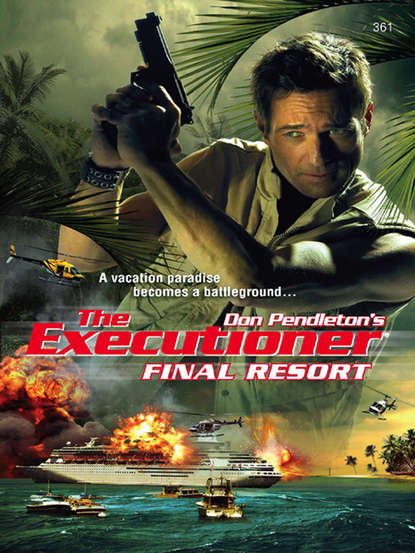По всем вопросам обращайтесь на: info@litportal.ru
(©) 2003-2025.
✖
Final Resort
Автор
Год написания книги
2019
Настройки чтения
Размер шрифта
Высота строк
Поля
After fieldstripping and reassembling the Beretta, Bolan relaxed on the short bunk as best he could. Combat experience had taught him to sleep virtually anywhere, if someone wasn’t shooting at him, and the tiny cabin of a submarine felt like the Ritz compared to some of Bolan’s other bivouacs. Running submerged, it had no pitch and roll like surface ships, only a steady thrumming from the mighty engines that propelled it through the depths.
5
Cuba
It took a team of army engineers three-quarters of an hour to clear the access road. Muhunnad had done his best with what he had, telling his men to disable the engine of each car used in the makeshift barricade and to flatten all four tires. Muhunnad had not booby-trapped the vehicles, because he feared that killing soldiers early on would prompt the Cubans to attack with everything they had, ignoring any danger to the hostages.
In fact, although Muhunnad’s men had done their utmost to prevent the cars from moving, short of torching them, it ultimately made no difference. An army crane had been dispatched and hoisted them aside, one by one, until the way was clear.
Now Muhunnad stood and waited in the hotel lobby, peering through a wall of lightly tinted glass, as a Jeep with three soldiers inside it approached. He had no doubt that there were others hiding on the grounds, surrounding the hotel block, weapons trained on every exit and window. And he smiled, knowing their efforts were in vain.
The Jeep drew closer, eased into the hotel’s driveway and stopped. Its driver kept the engine idling, while his passengers stepped from the vehicle. One clearly was an officer, although Muhunnad did not recognize the Cuban army’s rank insignia. The other was a common rifleman who stayed beside the vehicle, his weapon held at port arms while the officer approached the hotel’s air-conditioned lobby.
Muhunnad went out to meet him. He supposed there were snipers hiding in the darkness all around him, any one of whom could drop him with a single shot, but if that happened, it would touch off an immediate bloodbath inside. Muhunnad trusted that the Cuban officer was wise enough to recognize that fact, if nothing else.
When they were ten or twelve paces apart, the officer stopped short and without introduction said, “You speak English.”
Although he had not phrased it as a question, Muhunnad replied, “You know I do.”
A nod confirmed it. “Why are you doing this?” the soldier asked.
Muhunnad frowned. “You’ve heard our various demands.”
“Of course. I mean, why are you doing this in Cuba, when your target is America? We have no currency or influence in Washington. You must know this. Americans do not negotiate for hostages, much less in countries they refuse to recognize.”
“It was convenient,” Muhunnad said truthfully. “After Guantanamo, where was our hope of reaching the United States?”
His adversary seemed to see the sense in that, but plainly did not like Muhunnad’s answer. “You have Cuban citizens inside,” he said. “Employees. Common working people. If you’re wise, you will release them now.”
“Because Havana will not ransom them?”
“We share that trait, at least, with the Americans,” the officer replied.
“Too bad. They’ll have to die, then, I suppose.”
“If you harm a Cuban citizen—”
“What will you do?” Muhunnad challenged. “Storm the place and make us kill them all? I doubt it, but if that is your intention, why delay? By all means, do it. Come ahead.”
“You sound like an American,” the officer declared.
“We’ve learned our lessons from them too.”
“It is unfortunate that you must die, with all your men.”
“We don’t fear death,” Muhunnad said. “Unlike a Communist, we cherish faith in Paradise. Why else have we come here, today?”
“I understand, now.”
“Do you?”
“The demands are all for show. You mean to kill the hostages, no matter what is done,” the officer replied.
“You said yourself, Americans do not negotiate.”
“And if they did? What, then?”
“Then we would use their money and our liberated soldiers to pursue the great jihad.”
“Your cause is hopeless. Spilling blood for its own sake is worse than foolishness. It’s madness,” the officer said.
“Then give the signal to your snipers. Take me down,” Muhunnad said,
“There’s time enough for that,” the officer assured him. “We won’t fire the first shot, but I promise you, we’ll finish it.”
“Good luck,” Muhunnad said. “I hope you brought a lot of body bags.”
Tropic Princess
EMRE MANDIRALI DIDN’T KNOW exactly where they were, but there was water all around the ship, with no land in sight. It troubled him, thinking about the sea and all the creatures swimming in it, some of them miles deep and strange beyond imagination.
Which of them would come to feed on him when he was dead? Or would he simply drift and sink into the freezing depths where sunlight never reached, pickled in brine, preserved forever by the cold?
Вы ознакомились с фрагментом книги.
Приобретайте полный текст книги у нашего партнера:
Приобретайте полный текст книги у нашего партнера:











